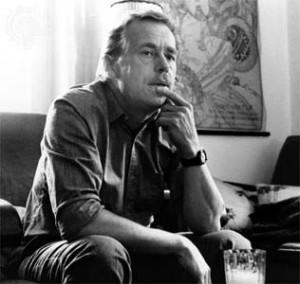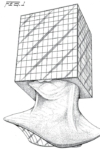 Vaclav Havel died over the weekend, bookended by Christopher Hitchens and Kim Jong-il, strange deathfellows for such a humane and war-hating individual.
Vaclav Havel died over the weekend, bookended by Christopher Hitchens and Kim Jong-il, strange deathfellows for such a humane and war-hating individual.
Havel became known in America for his contribution to the Prague Spring, The Memorandum, a play which humorously deconstructed the faceless bureaucratic socialism that existed in Czechoslovakia post-WW II. In the play, characters were given office instructions in a nonsense language, Ptydepe, which was created to avoid linguistic redundancies in the original Czech. This sets off a whole series of confusing events, eventually resolving itself with the creation of a new language, and everyone deciding to go to lunch. It’s funny in a pre-Office Space world.
Of course, the Prague Spring was an effort to put a human face on socialism, and Havel helped present just that, so by the time the Warsaw Pact invaded the country, they made sure Havel was banned from the theater and forced out of his life as a writer. Facing a life lived underground,Havel elected to stay in the country and continue his dissent from within the confines of a totalitarian regime (unlike one of his peers who fled and went on to more literary fame and substantial wealth, and subjected generations of college-aged men to agree with the girls they were trying to make out with that his books are actually good, *cough* Kundera *cough*. Sorry, had a cough. Kundera. Milan Kundera.)
Havel bounced around from job to job, practicing Czech “Svejkism,” waiting out the interminable end of the Warsaw Pact. He pursued a political life of dissent. His essay, “Power of the Powerless,” published in 1978, began with a variation of a famous beginning, “A SPECTER is haunting Eastern Europe: the specter of what in the West is called ‘dissent’.”
His essay describes not the flaws in either communism or socialism, but the distance between the actual citizen and whatever truth exists within the system. Havel correctly and beautifully elucidated that the lie was the biggest enemy. His main thesis is that any historicity the regime used to validate its dictatorship by political bureaucracy is out of step with any of the actual truth. He wrote,
“The original and most important sphere of activity, one that predetermines all the others, is simply an attempt to create and support the independent life of society as an articulated expression of living within the truth. In other words, serving truth consistently, purposefully, and articulately, and organizing this service.”
It’s a beautiful piece of writing, and one that earns a place next to “Letter from a Birmingham Jail,” in terms of clarity and truth-telling from a place of most miserable oppression.
During the Velvet Revolution, Havel emerged from the burgeoning left as its leader, and improbably emerged as the head of the transition-state. He was legitimately elected as president and set about pursuing state-building and reconciliation. His contribution to the bloodlessness of the Velvet Revolution cannot be understated. Compared to the monstrosities of Yugoslavia and Romania, the Velvet Revolution is still considered a miracle of diplomacy.
Havel returned to writing after his presidency, almost certainly one of the last writers-by-profession who will hold state power (unless an incredible shift in culture were to take place- we’re ready if you need us!)
Following this weekend of deaths, both in the intellectual and despotic sphere, let’s remember Vaclav Havel, playwright turned president, humanist truth-teller to the end.
This post may contain affiliate links.







